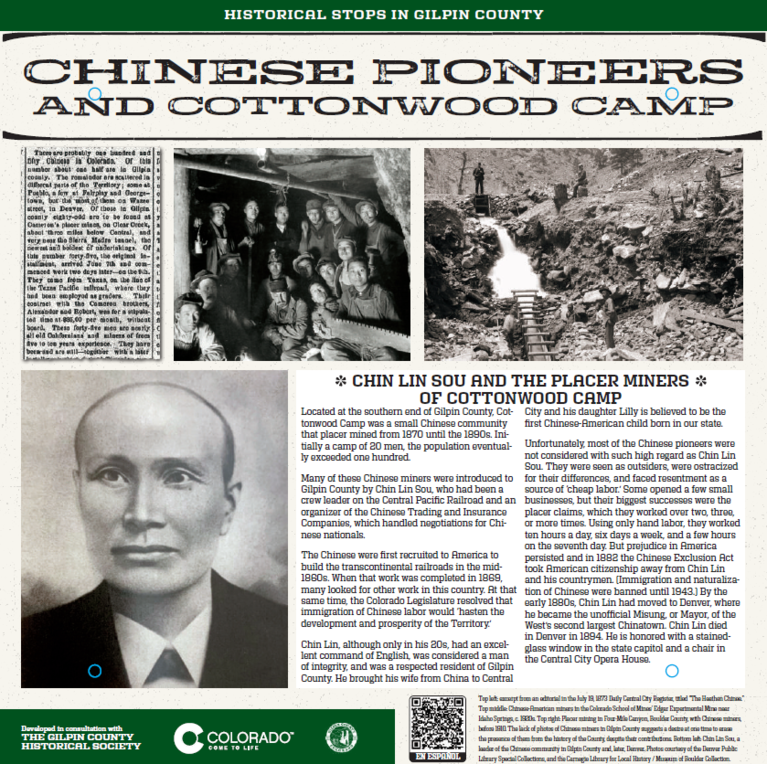Cottonwood Camp and Chinese Pioneers
Chinese Pioneers and Cottonwood Camp
Location: Highway 119, southbound, near mile marker 2
Information printed with permission of the Gilpin County Historical Society, originally published in Alan Granruth’s “The Little Kingdom of Gilpin – Gilpin County, Colorado”
“Located at the southern end of Gilpin County, Cottonwood Camp was a small Chinese community that placer mined from 1870 until the 1890s. Initially a camp of 20 men, the population eventually exceeded one hundred.
Many of these Chinese miners were introduced to Gilpin County by Chin Lin Sou, who had been a crew leader on the Central Pacific Railroad and an organizer of the Chinese Trading and Insurance Companies, which handled negotiations for Chinese nationals.
The Chinese were first recruited to America to build the transcontinental railroads in the mid-1860s. When that work was completed in 1869, many looked for other work in this country. At that same time, the Colorado Legislature resolved that immigration of Chinese labor would ‘hasten the development and prosperity of the Territory.’
Chin Lin, although only in his 20s, had an excellent command of English, was considered a man of integrity, and was a respected resident of Gilpin County. He brought his wife from China to Central City and his daughter Lilly is believed to be the first Chinese-American child born in our state.
Unfortunately, most of the Chinese pioneers were not considered with such high regard as Chin Lin Sou. They were seen as outsiders, were ostracized for their differences, and faced resentment as a source of ‘cheap labor.’ Some opened a few small businesses, but their biggest successes were the placer claims, which they worked over two, three, or more times. Using only hand labor, they worked ten hours a day, six days a week, and a few hours on the seventh day. But prejudice in America persisted and in 1882 the Chinese Exclusion Act took American citizenship away from Chin Lin and his countrymen. (Immigration and naturalization of Chinese were banned until 1943.) By the early 1880s, Chin Lin had moved to Denver, where he became the unofficial Misung, or Mayor, of the West’s second largest Chinatown. Chin Lin died in Denver in 1894. He is honored with a stained-glass window in the state capitol and a chair in the Central City Opera House.”

Campamento Cottonwood y los Pioneros Chinos
Ubicación: Carretera 119, dirección sur, cerca del marcador de milla 2.
Ubicado en el extremo sur del Condado de Gilpin, el campamento Cottonwood fue una pequeña comunidad de chinos que realizó minería de placer desde 1870 hasta la década de 1890. Inicialmente un campamento de 20 hombres, la población eventualmente superó los cien.
Muchos de estos mineros chinos fueron presentados al Condado de Gilpin por Chin Lin Sou, quien había sido líder de tripulaciones en el Ferrocarril Central Pacific y organizador de las Compañías de Comercio y Seguros Chinas, que manejaban negociaciones para nacionales chinos en los Estados Unidos.
Los chinos fueron reclutados por primera vez para América para construir los ferrocarriles transcontinentales a mediados de la década de 1860. Cuando ese trabajo se completó en 1869, muchos buscaron otros trabajos en este país. Al mismo tiempo, la Legislatura de Colorado resolvió que la inmigración de peones chinos "aceleraría el desarrollo y la prosperidad del Territorio".
Chin Lin, aunque solo tenía veintitantos años, tenía un excelente dominio del inglés, era considerado un hombre de integridad y era un respetado residente del Condado de Gilpin. Trajo a su esposa desde China a Central City y se cree que su hija Lilly fue la primera niña chinoamericana nacida en nuestro estado.
Desafortunadamente, la mayoría de los pioneros chinos no eran considerados con tan alto respeto como Chin Lin Sou. Fueron vistos como forasteros, fueron marginados por sus diferencias y enfrentaron resentimiento como fuente de "mano de obra barata". Algunos abrieron algunos pequeños negocios, pero sus mayores éxitos fueron las reclamaciones de placer, que trabajaron dos, tres o más veces. Utilizando solo mano de obra, trabajaban diez horas al día, seis días a la semana, y unas pocas horas el séptimo día. Pero el prejuicio en América persistió y en 1882 la Ley de Exclusión China le quitó la ciudadanía estadounidense a Chin Lin y a sus compatriotas. (La inmigración y naturalización de chinos fueron prohibidas hasta 1943). A principios de la década de 1880, Chin Lin se había mudado a Denver, donde se convirtió en el Misung no oficial, o Alcalde, del segundo barrio chino más grande del oeste. Chin Lin murió en Denver en 1894. Es honrado con una ventana de vidrio coloreado en el capitolio de Colorado y una silla en el Teatro de Ópera de Central City.